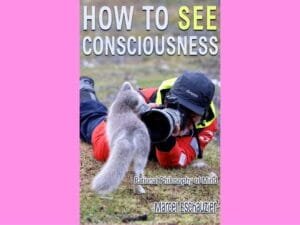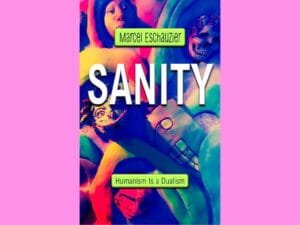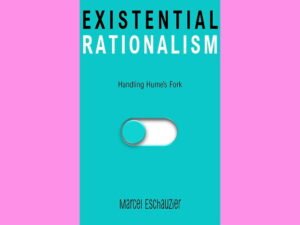In this article, I explore Oneless Oneness, a unique guide to nondual recognition published in 2022. This philosophical guide delves into the nondual nature of consciousness and what that means for our lives, presenting my rational approach to enlightened living. Let me share the background, motivation, and core messages of this work.
Find a special discount for the ebook Oneless Oneness via the Gumroad button below.
Table of contents
A philosophical manifesto and guide
Recently, I found a quote in a Luka Bönisch article capturing the essence of Oneless Oneness—my third published book:
“There seem to be two kinds of searchers: those who seek to make their ego something other than it is, i.e. holy, happy, unselfish (as though you could make a fish unfish), and those who understand that all such attempts are just gesticulation and play-acting, that there is only one thing that can be done, which is to disidentify themselves with the ego, by realising its unreality, and by becoming aware of their eternal identity with pure being.”
—Wei Wu Wei
This quote illuminates a central theme of Oneless Oneness: True enlightened living springs not from perfecting the ego but from recognizing its unreality, embracing our boundless essence, yet recognizing that any willful act involves a self. Just as we cannot make a fish unfish, we cannot make the self unselfish—a perspective that challenges common misconceptions about enlightenment and nondual recognition.

Entrance by reason or conduct
The legendary Bodhidharma, a 5th-6th century Buddhist monk who introduced Chan Buddhism to China and became the first patriarch of what later evolved into Zen Buddhism, spoke of two paths to satori (enlightenment): “entrance by reason” and “entrance by conduct.” Oneless Oneness guides you through the more direct of these paths—entrance by reason, also known as “entrance by higher intuition.”
Writing this book, I sought to provide the strongest logical pointers I could think of to help readers become aware of nonduality: understanding that the perceived separation between the objective world and subjective mind is illusory. Once you truly understand this deceptively simple fact and its vast implications, you are enlightened. However, understanding is not the same as memorizing concepts or even recognizing certain patterns.
Can one understand nonduality?
Truly, deeply understanding something means grasping not just its surface features, but its fundamental principles, interconnections, and implications across contexts. It involves being able to explain the concept simply, apply it flexibly to novel situations, and see how it relates to and influences other domains of knowledge.
Here’s the challenge: I’ve encountered only a handful of people who truly understand nonduality. Not because it’s complex—quite the opposite. It’s so fundamentally simple, yet so counterintuitive, that even the most brilliant minds often miss it. When writing Oneless Oneness, I had already published two books on nonduality: Existential Rationalism, a philosophical treatise, and Without Opposite, a philosophical novella. These experiences taught me how challenging it is to help others “see” nonduality. I wanted to test my own understanding: Could I explain it in its simplest form?
A left-brain personality
So, I set myself a target: Write 12 chapters of 7 aphorisms each, addressing nonduality’s quintessence and most significant implications. This became the first part of Oneless Oneness: a philosophical manifesto consisting of a logical chain of observations and conclusions. The second part emerged as a concise guide showing how nondual understanding can address common existential challenges—essentially, the healing power of Tao applied to fundamental human experiences.
The book’s aphoristic style won’t resonate with everyone. It represents an alternative road to nondual recognition to reach readers with different thinking styles and approaches to understanding. Through my publishing journey, I’ve discovered how rare “entrance by reason” is. My unusual approach may have to do with my engineering background—typically associated with “left-brain” thinking—which doesn’t always align with the “right-brain” orientation common in spiritual seekers. Engineers tend to have a low tolerance for cognitive dissonance but may lack holistic sensitivity, while spiritual seekers often have a higher cognitive dissonance tolerance than the typical engineer.
Paradoxes or contradictions?
The engineering mindset—focusing on general principles instead of specificities—brings an economic advantage: “Entrance by reason” is necessarily comprehensive and irreversible because in the rational nondualistic paradigm, everything aligns, without exception. In contrast, those who speak of enlightenment through conduct sometimes fall into contradictions, like insisting on “objective knowledge” through science and embracing concepts like a “mathematical universe” or “multiverse”—classic dualistic fallacies.
Seekers looking for entrance by conduct often concentrate on spiritual practice like meditation. I enjoy meditating but know little of its rituals and traditions. I do know that meditation isn’t required to instantly access the nondual essence, whether I’m thinking or not. Still, many “entrance-by-conduct” seekers consider thinking a hindrance to nondual recognition. When I point out contradictions in their nondual understanding, they sometimes tell me I think too much: “… these are paradoxes, not contradictions. And nonduality is anyway not conceptual, so we should think as little as possible to be nondually aware.”

Think differently
Unfortunately, my message of “entrance by reason” creates resistance among some spiritual seekers pursuing enlightenment “by conduct.” They may have glimpsed nonduality during meditation but haven’t achieved sustained enlightenment. They frequently view thinking as antagonistic to spiritual practice. Let me offer a different perspective on the relationship between thought and nondual recognition.
First, thinking comprises two elements: the immediate experience and the resulting concepts that extend beyond the present moment. The immediate experience of thinking is inherently nondual—as long as one doesn’t become entangled in the conceptual constructs produced, one can maintain nondual realization while thinking.
Second, thinking intrinsically involves intuition, which is nondual by nature. The moment of realizing a truthful answer to a matter ultimately springs from beyond our understanding, arising in our immediate experience. Thus, even rational thought contains a fundamental Zen element.
Third, nondual recognition can emerge from rational beliefs themselves. While duality feels intuitive, it’s actually irrational—similar to how the Earth appears flat despite being spherical. I use the term “irrational” precisely: Duality violates several principles of rational thought, as detailed in Existential Rationalism. Though a full explanation exceeds our scope here, understand that duality involves multiple contradictions, while only nonduality aligns with rational thought’s four fundamental rules. Shaping rational beliefs is a compelling way to harness intuition.
The rational nature of nonduality doesn’t guarantee universal understanding. Grasping nonduality requires a special kind of “aha” moment. While typical epiphanies restructure our conceptual understanding within duality, the nondual “aha”—the awakening—penetrates the very mechanism of conceptual understanding itself. Being preconceptual, this understanding defies verbal expression. And enlightenment is particularly hard to fathom because it goes against assumptions every conscious being is born with.
Nonduality misconceptions
While meditation can certainly lead to nondual recognition, constantly suppressing thoughts to maintain this state seems unnecessarily challenging. Instead, Oneless Oneness presents rational beliefs that harmonize with nondual recognition, transforming thinking from obstacle to ally. This approach feels more authentically Zen because it embraces the present exactly as it is, including our thoughts.
Consider the paradox: How can an “anti-thinking” nondualist function as a scientist or in any cognitive profession? Should one be nondual in spiritual matters but dual in mundane ones? Such division itself exemplifies dualistic thinking.
An even greater misunderstanding equates “entrance by conduct” with virtuous behavior: “Nondualistic awareness means avoiding all conflict, always turning the other cheek, maintaining perpetual calm, and experiencing constant gratitude.” This sympathetic but naive interpretation stems from two millennia of Christian influence and doesn’t necessarily work in a secular or multi-religious world. The Western emerging awakening to the nondual truth requires patience and understanding.
The battlefield
The “pacifist” nonduality interpretation contrasts sharply with Krishna’s counsel to Arjuna in the Bhagavad Gita. This ancient text presents a dialogue between Krishna, embodying divine wisdom and ultimate reality, and Arjuna on the Kurukshetra battlefield. Faced with fighting his own family, Arjuna falters. Krishna’s guidance reveals a deeper truth:
“Considering your dharma [duty], you should not waver, for there is nothing higher for a warrior than a war fought for the sake of dharma.”
“Happy are the warriors to whom such a war comes, presenting itself as an open door to heaven.”
This teaching suggests that true nondualism involves embracing one’s role within apparent duality rather than attempting to transcend it through inaction or thoughtlessness. Krishna emphasizes that enlightened individuals should engage fully with the world and uphold dharma when necessary, even amid conflict.
Summing it up
Here lies perhaps the deepest and most misunderstood truth about nondual realization: The enlightened person recognizes the self’s unreality but must still engage with the world as if the self exists. There’s simply no alternative way to participate in worldly existence! This illuminates Wei Wu Wei’s (a.k.a. Terence Gray’s) insight about the impossibility of making the self unselfish.
Even altruism ultimately stems from self-interest. Choosing to be caring and compassionate toward others reflects your values. While admirable, following duty and sacrificing personal interests for others doesn’t eliminate the self.
For those seeking nondual realization, I strongly recommend “entrance by reason” for its clarity and freedom from misunderstandings and false spiritual promises. Oneless Oneness offers a unique path to this understanding.
Target audience
- Philosophy enthusiasts: Ideal for readers curious about metaphysics, Zen Buddhist principles, and existential philosophy, blending rational inquiry with spiritual insights.
- Seekers of inner peace: Perfect for individuals seeking mental clarity and emotional balance in a chaotic world, offering practical guidance for a more peaceful mindset.
- Rational thinkers: Suited for those who prefer a logical, reason-based approach to spirituality and awakening, merging Eastern wisdom with Western rationality.
- Self-development readers: For those looking to improve their well-being and live more authentically, the book provides a clear path to nondual recognition and inner freedom.
Key benefits for the reader
- Inner peace: Nondual recognition helps you let go of ego-driven conflicts, bringing a deep sense of peace by embracing the present moment without judgment or anxiety.
- Mental clarity: By understanding the mind’s role in creating duality, you can dissolve mental noise and confusion, leading to clearer, more focused thinking.
- Overcoming anxiety and compulsion: The book helps reduce existential anxiety and compulsion by finding guidance in the present, allowing you to undauntedly face uncertainty and temptation.
- Authentic living: Oneless Oneness guides you to live in alignment with your true nature, leading to a more genuine, fulfilling life.
From the back cover
“The world’s shortest (but not easiest) rational guide to everyday nondual recognition.
Enlightenment is the ultimate self-help because it helps you realize that the self does not exist. What looks absurd and disturbing at first can grow into inspirational insight. Oneless Oneness is a fresh look at ancient Zen philosophy—not for the dogmatic, ideological, or faint-hearted, but for rational minds willing to question deeply ingrained beliefs.
- Do you wonder what the Zen masters mean by enlightenment?
- Would you like to enjoy the benefits of enlightenment too?
- Did you know that you don’t have to meditate to awaken to Tao? You only need an open mind—and a book like this.
Inspired by the Zen sages and based on his own experience, the author—a trained engineer—demystifies the key insights into nonduality. In a condensed, aphoristic style, he explains how nondual recognition can help us deal with all-too-human issues: from guilt, regrets, and compulsion, to forgiveness, mindful enjoyment, and matters of the heart.
Discover how Tao’s culture-transcending truth reconciles Eastern spirituality with Western rationalist philosophy. Oneless Oneness is a philosophical manifesto and guide in one. Pithy and outside the box, it connects the dots for thinkers and seekers alike.”
What readers say
“This is it! A fresh insight into the deepest philosophy of all – Eastern Non-Duality. Approached in a direct, logical manner that is accessible to a wide audience.”—Amazon customer
“Oneless Oneness: Tao as an Existential Remedy, by Marcel Eschauzier is the third in the Unlock Tao series and a self-help book for people looking to open their minds to this ancient philosophy. This straightforward look at Taoism uses simple terms and aphorisms to help the lay-person understand the pathway to enlightenment through Zen. […] I had to read some of the sentences over and over to get them straight but it was rewarding and enlightening. This book does not take on the religious or spiritual aspect of Taoism, just the physics and healing nature of it. A thought-provoking read with ideas in bite-sized portions. Highly recommended.”—Amazon customer
“This book helped me finally get a grasp on what the Tao and Zen are all about. I was trained as a Mathematician and have always had a keen interest in philosophy, especially the philosophy of religion. I was first introduced to Taoism some 30 years ago and it really resonated with me. I never got the opportunity to immerse myself in it because of job and family. Since retirement, I’ve had that opportunity, and have enjoyed reading everything of interest to me about the Tao and Zen, but to tell the truth I still didn’t really grasp it. Especially Zen. This book has helped me get a grip on it. I can almost feel it now. Great book for me.”—Amazon customer
“Oneless Oneness has honestly changed my life. It’s helped me let go of trying to control everything and just be in the moment.”—Amazon customer
Oneless Oneness regularly topped the Amazon Bestseller charts in the USA (Kindle categories Existential Psychology, Gambling Addiction, and Philosophy Aesthetics) and many other countries.
Discover more articles about Marcel’s books here.
As a thank you for reading this article, use this button to get your copy of Oneless Oneness with a 20% discount:
The latest editions, mindful gifts, and exclusive gear: Visit Marcel’s Booktique on Gumroad to support Marcel’s work and enhance your elegance at the same time!
Oneless Oneness—in audiobook, print, and pixel—can be found here too:
Amazon Audible | Kindle | Paperback | Hardcover | More retailers
Looking for mindful & funny spiritual gifts, gear, deco, or gadgets? Why not check out the affordable Amazon Merch custom designs by Simply Nondual!
Share this article:





[…] divine is agnostic, meaning that I try to avoid claims about the supernatural. Still, in my books Oneless Oneness, Awakening the Other Way and Sanity, I follow Pascal’s example of applying reason to […]
[…] seeking practical guidance for self-help and well-being. The latter group may be better served with Oneless Oneness: Tao as an Existential Remedy or Awakening the Other Way: Nonduality and Existential […]
[…] Those interested in the direct path to enlightenment “through reason” may read Oneless Oneness. If you want to learn more about the detrimental impact of dualistic thought, Sanity is the book […]
[…] seeking practical guidance for self-help and well-being. The latter group may be better served by Oneless Oneness: Tao as an Existential Remedy or Awakening the Other Way: Nonduality and Existential […]
[…] knowledge of the unknowable, whether affirmation or denial, is a contradiction. Still, in my books Oneless Oneness, Awakening the Other Way, and Sanity, I follow Pascal’s example of applying reason to […]
[…] searching for a no-frills, direct path to enlightenment “through reason” may explore Oneless Oneness. If you want to learn more about the ruinous impact of secular dualistic thought, and what we can […]